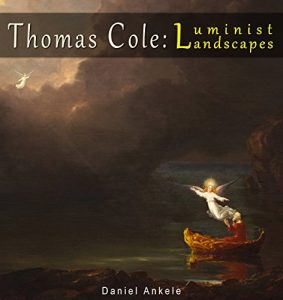(Revised 7/2014 - 140 Larger HD Masterpieces formatted for Kindle HDX, HD, Kindle for iOS and Android tablets with annotations and introduction by Louis Legrand Noble.)
THOMAS COLE: LUMINIST LANDSCAPES Art Book contains 140 paintings of landscapes, religious, mythological and historic scenes with annotations and introduction below. Book includes; Table of Contents, Top 50 Museums of the World and is compatible with all Kindle devices, Kindle for iOS and Android tablets (use rotate and/or zoom feature on landscape/horizontal images for optimal viewing).
Thomas Cole, the only son of James and Mary Cole, and the youngest but one of eight children, was born at Bolton le-Moor, Lancashire, England, on the 1st of February, 1801. His father, a woolen manufacturer, was better fitted to enjoy a fortune than to accumulate one. Possessed of the kindest heart, a gentle disposition, and of perfect honesty, in connection with much poetic feeling, taste and fancy, he never thrived as a man of business, and succeeded infinitely better in attaching his children to him by a lasting affection, than in providing for their advancement in the path of wealth. He failed eventually in his manufactory, at Bolton, and finally removed to Chorley, a town in the same shire.
Now in his ninth year, Thomas was sent to school, at Chester, where, from harsh discipline, poor fare and sickness, he suffered so severely as to carry the remembrance, if not the effects of it, through life. While his first lessons in suffering were at school, it was at Chorley that young Thomas was more intimately made acquainted with those trials and privations which attended him for several years. He there entered a print-works as an engraver of simple designs for calico. Although his father wished to apprentice him either to an attorney or to an iron manufacturer, for which there occurred good opportunities, yet there was a secret impulse in his breast, even at that early age, which turned him from those substantial vocations to make, what seemed to others, but a foolish choice. In the designs and colours, with which his daily work was making him familiar, there was a charm of which he could never dream in the subtleties of the law, and the ponderous operations of iron-making. (cont)
THOMAS COLE: LUMINIST LANDSCAPES Art Book contains 140 paintings of landscapes, religious, mythological and historic scenes with annotations and introduction below. Book includes; Table of Contents, Top 50 Museums of the World and is compatible with all Kindle devices, Kindle for iOS and Android tablets (use rotate and/or zoom feature on landscape/horizontal images for optimal viewing).
Thomas Cole, the only son of James and Mary Cole, and the youngest but one of eight children, was born at Bolton le-Moor, Lancashire, England, on the 1st of February, 1801. His father, a woolen manufacturer, was better fitted to enjoy a fortune than to accumulate one. Possessed of the kindest heart, a gentle disposition, and of perfect honesty, in connection with much poetic feeling, taste and fancy, he never thrived as a man of business, and succeeded infinitely better in attaching his children to him by a lasting affection, than in providing for their advancement in the path of wealth. He failed eventually in his manufactory, at Bolton, and finally removed to Chorley, a town in the same shire.
Now in his ninth year, Thomas was sent to school, at Chester, where, from harsh discipline, poor fare and sickness, he suffered so severely as to carry the remembrance, if not the effects of it, through life. While his first lessons in suffering were at school, it was at Chorley that young Thomas was more intimately made acquainted with those trials and privations which attended him for several years. He there entered a print-works as an engraver of simple designs for calico. Although his father wished to apprentice him either to an attorney or to an iron manufacturer, for which there occurred good opportunities, yet there was a secret impulse in his breast, even at that early age, which turned him from those substantial vocations to make, what seemed to others, but a foolish choice. In the designs and colours, with which his daily work was making him familiar, there was a charm of which he could never dream in the subtleties of the law, and the ponderous operations of iron-making. (cont)






